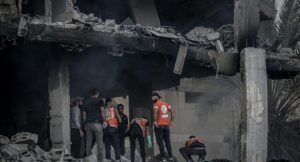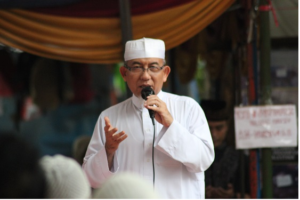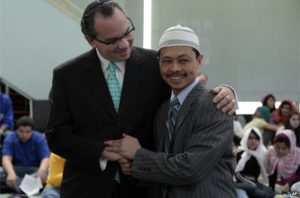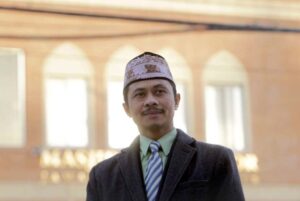By: Imam Shamsi Ali, President of Nusantara Foundation, New York
In the first part of this paper, it is stated that building the right mindset or insight about worldly life and religion at the same time becomes part of the most important pillar for the realization of Khaer Ummah (the best people).
This third point I conclude in the words “Iqra’ insight”. That this Ummah must again realize the urgency of Iqra not only in religion. But it is equally important to have iqra ‘in understanding our worldly life. Of course more specifically when we realize that our world is currently undergoing an unexpected change.
Fourth, the urgency of character transformation. Of course the character in question includes individual characters and social characters. This character is called in religion with morality which is the essence of one’s religiosity.
Also Read: Verses of the Universe in Gaza: The Unyielding Light of Faith
Character (behavior) or morals become very essence in religious teachings. It even becomes a determinant of one’s religiosity. This means that for a person to be considered a religious person, much is determined by how a person is able to prove this teaching in his behavior, both at the individual level and at the social level.
And therefore all aspects of this teaching become a bridge for the formation of that morality. Worship and even the faith aspect of this religion must be proven by character. Believing in Allah who is all-seeing should build the character of honesty. Prayer protects from evil and evil.
That reality seems to be concluded by the Prophet in his hadith: “Indeed I was sent to perfect the glory of morals”. The Prophet sallallaahu ‘alaihi wasallam himself in the Quran is specifically praised for his high morals: “Indeed you (Muhammad) have high morals).
Whether we realize it or not, currently one of the crises, especially for Muslims, is a moral crisis. It is no exaggeration to say that the Ummah has not only failed to prove the beauty of Islam. But as one cleric said: almost Islam is covered by the behavior of the Ummah (bad).
Also Read: Prophet Sulaiman Alaihi Salam, the Greatest Muslim King of All Time
At the individual level, the Ummah tends to limit Islam as a narrow ritual reference which is often ceremonial and symbolic. But it does not have real social meanings (reality) in life. As a result, these rituals eventually lead to bankruptcy as in the hadith of the Prophet (see hadith al-muflis).
Such religion leads to what I call a “split personality”. Personality like this is better known as “double standard personality”. In the mosques or in Mecca they are religious people. When in the market or parliament/office they are often more ferocious than animals in behavior/character.
The crisis of the Ummah’s character is certainly not only at the individual level. But also at the national collective level and even at the global level. The crisis of character/morals makes non-Muslim-majority countries, New Zealand for example, more Islamic than many countries with Muslim-majority populations.
Therefore, the collective character of the Muslim-majority nations needs to be reformed. I don’t know if this is the so-called “moral revolution”. But regardless of political understanding, this Ummah needs to carry out that moral revolution.
Also Read: Imaam Yakhsyallah Mansur: Surah At-Tin Indicates the Command to Liberate Al-Aqsa
If not, the beauty of Islam which is an attraction and a factor, especially people’s interest in this religion, will be hindered. The biggest dilemma, of course, is the question of some of those who are interested in this religion: “if I converted to Islam, who would I be like?”.
This question should be answered by this Ummah with: “look at us”. Because we are a beautiful representation of the teachings of Islam. Islam is peaceful, friendly, friendly. But also Islam is not easy to fade and drift to the passions of others.
Such a character is known as the “wasathiyah” character which is the basic character of the Ummah. Isn’t this ummah really the ummah of wasathon? (Continued). (T/RE1)
Mi’raj News Agency (MINA)
Also Read: Imaam Yakhsyallah: Nurture Love for the Prophet, One Will Be with Whom One Loves




































 Mina Indonesia
Mina Indonesia Mina Arabic
Mina Arabic